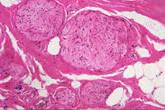Anti-LINGO-1 shows promise in repairing nerve damage seen in multiple sclerosis patients
WEDNESDAY, April 15, 2015 (HealthDay News) — An experimental drug appears to repair nerve damage seen in multiple sclerosis patients, results of an early trial suggest. The results are to be presented next week at the annual meeting of the American Academy of Neurology, held from April 18 to 25 in Washington, D.C. The trial was the second of three phases required for U.S. Food and Drug Administration approval of the drug, known as anti-LINGO-1.
Diego Cadavid, M.D., who is with Massachusetts-based Biogen Idec, which makes the drug and funded the trial, and his colleagues gave 82 patients with acute optic neuritis high doses of steroids before randomly assigning them to anti-LINGO-1 or placebo. Every four weeks, patients received a dose of anti-LINGO-1 until six doses were given. Participants were then assessed every four weeks for six months. They underwent a final assessment at eight months.
The researchers found that people treated with anti-LINGO-1 had significantly improved nerve repair compared with people who received the placebo — 34 percent greater at six months and 41 percent at eight months. Moreover, more than half of people treated with the drug saw a return to normal or near normal function, compared with 26 percent of patients who received the placebo.
“The hope for this drug is that in people who have multiple sclerosis, or any other disease that damages myelin, it will regenerate myelin that is lost,” Cadavid told HealthDay. The researchers are now testing the drug in multiple sclerosis patients in hopes of seeing similar myelin regeneration. “A second phase 2 study in people with relapsing forms of multiple sclerosis is evaluating the clinical benefit of anti-LINGO-1 when used long-term in people with different degrees of multiple sclerosis disability,” Cadavid said.
Copyright © 2015 HealthDay. All rights reserved.








